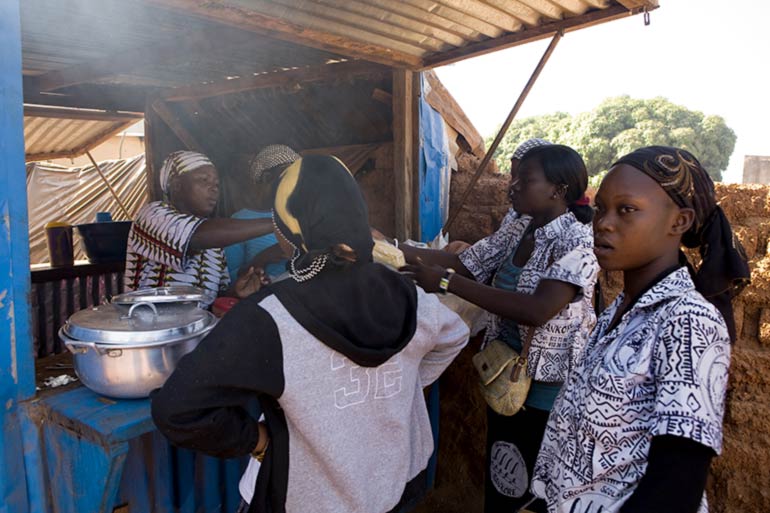How can we work together better in the Sahel?
On April 20, Fondation de France organized a video conference with 12 donor-advised funds working in the Sahel region, to discuss the specifics of the projects carried out there. Tertius Zongo, the prime minister of Burkina Faso from 2007 to 2011, shared his vision and long experience of development policies in the region with participants.
Despite the very many organizations that operate in the Sahel, this area seems to be sinking further into a state of permanent crisis, added to which is the obvious risk of fallout from the war in Ukraine. And yet, the Sahel’s many resources are a source for hope: the employment pool, especially in the agricultural sector, the development of intra-regional trade, a structured and open civil society, the involvement of young people in social and inclusive economies, digitization and culture, moderately encouraging health and education indicators, etc.
How can the work of donor-advised funds usefully contribute to the needs of a responsible Sahelian society, in charge of its own destiny? That question was the throughline of these discussions.
For Tertius Zongo, who opened the event, the security problem in the Sahel cannot justify inaction, with the considerable cost that would entail. According to him, analyzing the situation by drawing on local skills, ensuring that beneficiaries appropriate the initiative, coordinating the projects set up and assessing them are all strategies that will make sure that the projects deployed in the Sahel are lasting and effective.
Hélène Rousseau, from donor-advised fund Alima, reviewed the operating procedures of this humanitarian organization that works in Africa. Its model centers on national NGOs, the health ministries of the relevant countries as well as their local populations, which are best placed to identify needs and suggest long-term solutions. The need for durability and effectiveness also translates into research, so that problems can be nipped in the bud. Which is how Alima cares for patients affected by Ebola in dedicated health centers in Guinea and the Democratic Republic of the Congo. It has also put its faith in research, with winning results: two drugs that are effective against the virus have been identified and treatment for the patients have reduced mortality from 70% to less than 20%. To summarize, Alima’s work “goes from a care strategy to a prevention strategy,” according to Hélène Rousseau.
The Frères des Hommes (Brotherhood of Mankind), a donor-advised fund represented by Claude Dalbéra, works over the long term and counts on partnerships. How can we act to protect the environment against a background of insecurity riddled by terrorists and bandits? How can we address soil degradation in the Sahel while populations keep on growing? With solid experience acquired in the field, Claude Dalbéra insisted on the fact that designing development programs was very important. They also boosted agricultural production, health, education and culture.

For its part, Fondation de France supports around twenty projects each year, led by farming organizations, nonprofits and research institutions as part of its Family Agriculture Program in western Africa. The objective is to create an environment conducive to family agriculture. Gaëlle Kergraisse, the head of this program, highlighted the importance of cooperation and networking for all sector players (farmers, consumers, government agencies, etc.). Karine Meaux, head of the Fondation de France International Development and Emergencies missions highlighted the benefits of projects co-funded with donor-advised funds, to create interaction and reinforce impact.
Yves Derville, president of Fondation Sahel Aqua Viva – which works in Mali on help for disabled people and rural development – was keen to mention two vital concepts to conduct effective projects in the region. First, innovation: “Local know-how naturally needs to be in the showcased but local people also need to be able to be more effective and productive, by capitalizing on new technologies. Developing countries also have a right to innovation!” Words illustrated by an initiative for supporting fish farming, which draws on local know-how, where new processes to modernize businesses and investments motivate people, ensuring that the project will be a lasting one.
The second concept to take into account is the current climate, which creates new needs, as evidenced by the victims of sharia law and antipersonnel land mines in the foundation’s center for disabled people, where they are fit with prostheses. The current climate also creates new constraints. For example, it is becoming more difficult to travel, because of insecurity, the lack of administrative structure in certain countries and hesitancy on the part of traditional funders who are not sure about providing support in the region.
For its part, the Fondation Esplorado chose to concentrate efforts on research and finding fresh development leverage in the countries of the South. This is how Christophe Angely, who co-founds the foundation with his spouse, summarizes the approach: “It’s important to take the time to think things through first. For example, a significant portion of decentralized electricity projects have failed. It’s crucial to encourage research to better understand why these projects failed and propose future, more effective solutions.” He also recommends pooling financial resources for research initiatives, with everyone sharing in the findings to back up future projects and guide the decision makers.
“The search for solutions must factor in the complexity of the local context, by drawing on local expertise and banning standard responses” declared Tertius Zongo at the end of his presentations, praising “dialog with players very close to the ground.”

